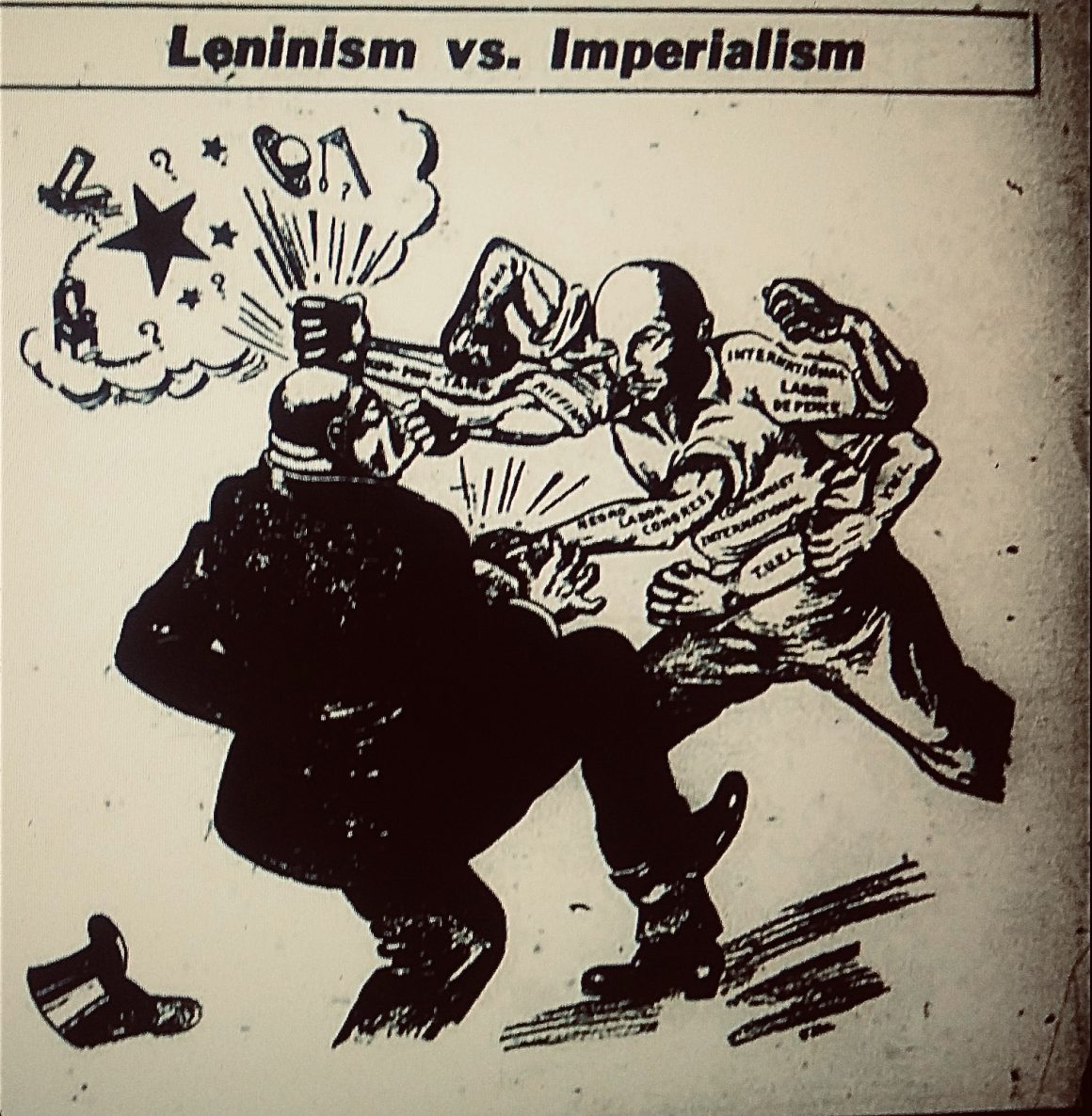The warning I’m making can be summarized as: don’t put action before understanding, don’t put praxis before theory. Many times, I’ve talked about how there’s sociological evidence supporting the idea that an armed uprising will come from society’s most disenfranchised people within our generation. The felons who’ve been deprived of voting rights, privacy, and employment opportunities; the millions who are unable to feed their families; the generation of young people who have nothing to lose because of how bad their economic circumstances are; these are the ones most likely to begin waging guerrilla warfare against the capitalist settler state within the next few decades. This is true in itself. But what I haven’t made sufficiently clear in my analyses of these social factors is that just because such an uprising is increasingly probable, doesn’t mean this will necessarily bring revolution. Unless there’s a communist party that can guide these angriest elements of the masses in the right direction, their efforts will be defeated by the forces of reaction.
This is because such elements, though angry at the system which has subjugated them, have been deprived of the educational resources necessary to know how to defeat the system. Marxism-Leninism, with its goal of overthrowing the capitalist state and building a workers state, likely isn’t the first set of ideas that a person encounters when their conditions have prompted them to gravitate towards revolutionary politics. Most of the time the default sets of “revolutionary” ideas under capitalism are not revolutionary, but false solutions designed to reinforce the existing social order.
There’s anarchism, which claims that the state can be abolished immediately despite this being impractical during the current era’s level of bourgeois strength. There’s social democracy, which redefines “socialism” entirely by portraying the imperialist bourgeois Nordic states as socialist. There’s Maoism, which redefines what imperialism and the bourgeois state mean in order to portray socialist examples like China as affronts to “true” communism. There’s Trotskyism, which often makes the same arguments the Maoists do except their motive is to perpetuate a century-old sectarian split. There are many other ideological strains that claim to represent class struggle, but that truly represent obstacles to class struggle. And the feds are eager to nurture their tendencies towards frustrating the labor movement, whether this means producing propaganda which promotes the divisive ideas of these strains, or sending in infiltration agents to make these strains act on their darker impulses. The forces of reactionary intrigue are trying to bring about the scenario Lenin warned against in What Is To Be Done, the scenario where bourgeois ideology corrupts spontaneous mass revolts and diverts the class struggle into dead-end efforts.
“The younger the socialist movement in any given country, the more vigorously it must struggle against all attempts to entrench non-socialist ideology,” wrote Lenin, “and the more resolutely the workers must be warned against the bad counsellors who shout against ‘overrating the conscious element,’ etc. The authors of the Economist letter, in unison with Rabocheye Dyelo, inveigh against the intolerance that is characteristic of the infancy of the movement. To this we reply: Yes, our movement is indeed in its infancy, and in order that it may grow up faster, it must become imbued with intolerance against those who retard its growth by their subservience to spontaneity. Nothing is so ridiculous and harmful as pretending that we are ‘old hands’ who have long ago experienced all the decisive stages of the struggle.”
These anti-Marxists Lenin referred to represented another bourgeois idea which has the potential to corrupt a mass revolt, and this is the idea that you need to forsake focusing on ideological struggle to be able to reach the masses. This idea comes from the deeper misconception which Lenin was arguing against within that section: the one that you need to subordinate yourself in total to the spontaneous momentum of the masses. Such an approach entails neglecting to ensure that the members of your cadre all properly understand the theory, or that they’ve all learned the ability to reject dogmatism and engage with the existing theory in an intellectually rigorous fashion.
It also entails not challenging anti-Marxist ideas when you encounter them throughout your daily life, and not actively trying to spread Marxist ideas among those who haven’t so far become Marxists. In other words, engaging in the types of passive liberalism which Mao described as: “To hear incorrect views without rebutting them and even to hear counter-revolutionary remarks without reporting them, but instead to take them calmly as if nothing had happened….To be among the masses and fail to conduct propaganda and agitation or speak at meetings or conduct investigations and inquiries among them, and instead to be indifferent to them and show no concern for their well-being, forgetting that one is a Communist and behaving as if one were an ordinary non-Communist.”
This approach doesn’t encourage properly educating those within your organization’s ranks, or doing sufficient educational work among the masses. It encourages lax theoretical consciousness and “book worship,” as Mao called it, placing people’s ability to organize and engage in militancy above their doing the necessary intellectual work. When an individual or a party doesn’t know what they need to do, or how to find out what they need to do, their work will be done incorrectly, and revolution won’t come about from their work.
This is the mistake we’ll make if we interpret our current social reality, where the lumpenproletariat and the lowest rungs of the working class have growing potential for spontaneous armed revolts, as a mandate for treating the future participants in these revolts as necessarily qualified to lead the revolution. Eagerness to take action doesn’t in itself make one qualified to act in the class struggle’s best interests, not without a sufficient education on how to conduct oneself as a revolutionary. Understanding of dialectics doesn’t yet dominate these elements, the communists haven’t so far managed to educate enough people among them. So those within these elements who are most willing to engage in armed struggle are vulnerable to undialectical ideas, ones that could lead them to make counterproductive decisions unless they’re first guided in the right direction.
This isn’t me quibbling over minor sectarian disagreements, I work with people who disagree with me if they prove themselves to be trustworthy. This is me warning about dangerous actions which can come from incorrect understanding of what revolutionary struggle means. Whether these actions are adventurist violence that’s carried out when the masses aren’t yet ready to support it, honor-motivated violence that’s directed towards people who’ve merely wounded one’s sense of pride, or sectarian violence that’s directed not towards the fascists but towards socialists from different strains. Unless someone is willing to stop these kinds of things when confronted about them, purging them from one’s cadre is the best course of action.
These kinds of petty, emotionally motivated acts of violence serve the individual, not the class struggle. As do less severe offenses that also harm the revolution’s interests, like rallying people to demonstrate without giving them direction, not enforcing the strict discipline on ideology and action that only democratic centralism can provide, or not prioritizing ideological struggle within one’s organization. All of these things stem from the attitude that we must take a totally passive role within the development of history, that all we need to do is organize according to the spontaneous mass uprisings while not taking charge of the situation, and without having done the mass educational work prior to when the spontaneous armed uprisings have begun. If we let this attitude guide us, we’ll end up engaging in the other type of passive liberalism Mao described, which is: “To see someone harming the interests of the masses and yet not feel indignant, or dissuade or stop him or reason with him, but to allow him to continue.”
Such a theoretically lax attitude is what’s behind the ultra-leftist fetishization of gangs, and of the existence of the lumpen. Just because these elements can have a desire for revolt due to their disadvantaged social position, doesn’t mean they’re necessarily prepared to act as a vanguard, or to take the steps needed for revolution. That would require bringing the gang members out of the gangs, and providing them and the other lumpenproles with the educational, material, and self-protective resources necessary for them to be effective revolutionaries. The equivalent applies to the members of the proletariat, who also currently lack the knowledge and tools needed for their revolutionary urges to translate into the appropriate actions. We must provide these things for them, not expect them to acquire these things on their own.
Through such an active approach, we can enable the workers to contribute what we need from them, which is a direct account of the needs of the people. As Lenin said following his warnings against relying on the spontaneity of the masses: “This does not mean, of course, that the workers have no part in creating such an ideology. They take part, however, not as workers, but as socialist theoreticians, as Proudhons and Weitlings; in other words, they take part only when they are able, and to the extent that they are able, more or less, to acquire the knowledge of their age and develop that knowledge. But in order that working men may succeed in this more often, every effort must be made to raise the level of the consciousness of the workers in general; it is necessary that the workers do not confine themselves to the artificially restricted limits of ‘literature for workers’ but that they learn to an increasing degree to master general literature. It would be even truer to say ‘are not confined’, instead of ‘do not confine themselves’, because the workers themselves wish to read and do read all that is written for the intelligentsia, and only a few (bad) intellectuals believe that it is enough ‘for workers’ to be told a few things about factory conditions and to have repeated to them over and over again what has long been known.”
On the contrary to this false view that Lenin repudiates, it’s not necessarily the job of the studied Marxists to inform the workers about the conditions they face. That would be an elitist and hubristic way of relating to the workers. Often, it’s our job to ask the workers themselves about what their conditions are, about which rights to personal freedom or material prosperity the bourgeoisie are withholding from them. Then we must analyze these contradictions through the lens of dialectical materialism, which is to say find out how they can practically be resolved. Then we must present these analyses to the workers, and partner with them on reaching such an end to capitalism’s contradictions. The equivalent goes for the contradictions of colonialism, and for the members of the oppressed nations within the United States. (Though these categories of class and national oppression are inextricably intertwined.)
The important things are to take an active rather than passive role within the liberation struggles, while at the same time directly listening to the masses on their needs so that we can properly address them. The masses have crucial things to learn from the studied Marxists, and we have crucial things to learn from the masses. By cultivating this relationship of active guidance on both sides, we can avoid alienating ourselves from the masses, or uncritically embracing whatever anti-Marxist ideas may come to grip the masses without our intervention.—————————————————————————
If you appreciate my work, I hope you become a one-time or regular donor to my Patreon account. Like most of us, I’m feeling the economic pinch during late-stage capitalism, and I need money to keep fighting for a new system that works for all of us. Go to my Patreon here.








